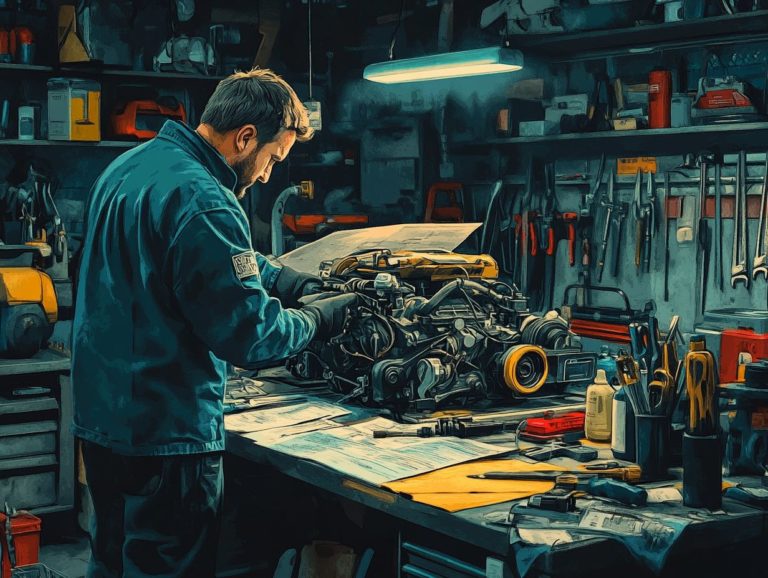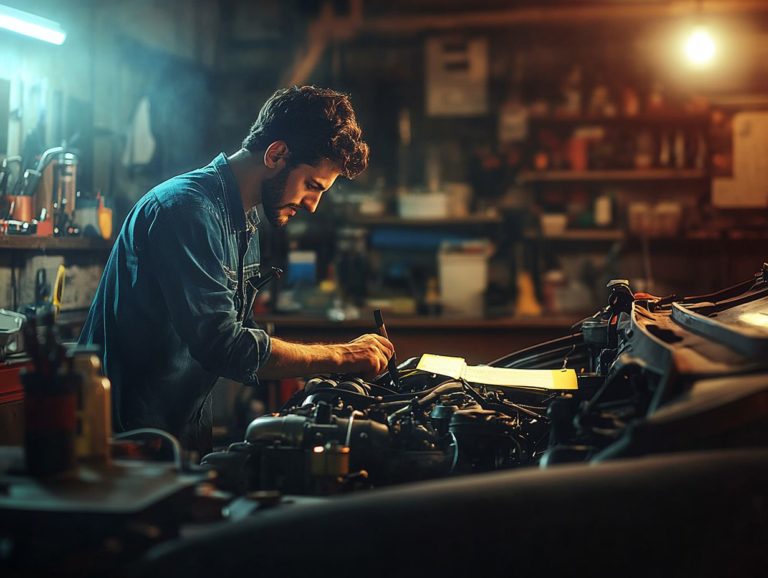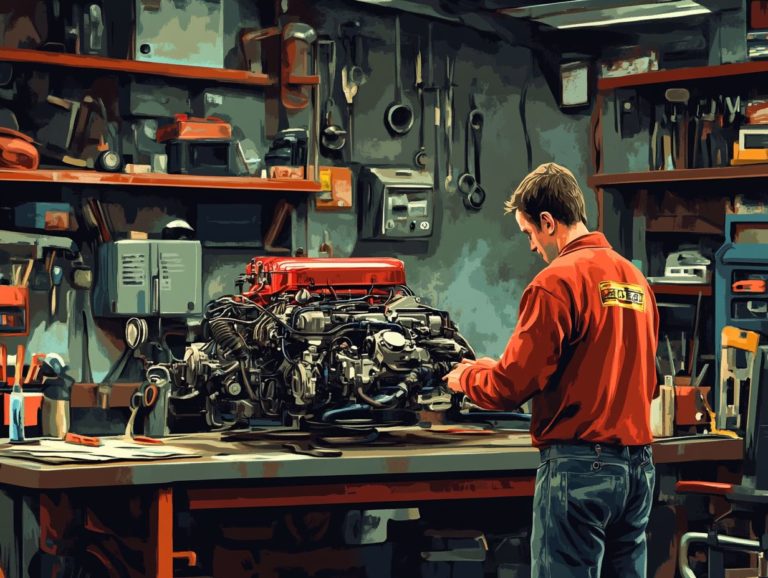How to Identify Common Car Issues Early
Catching car issues early can save you a significant amount of time, money, and frustration in the long run.
This article delves into the visual and audible cues that may signal something is amiss. It also covers changes in your vehicle’s performance that you should be vigilant about. It outlines when to handle repairs on your own and when to call in the professionals. Additionally, it shares vital tips for preventive maintenance to keep your car running at its best.
Explore this guide to ensure your vehicle stays in top condition and to identify those red flags before they escalate into costly problems.
Contents
- Key Takeaways:
- Signs of Common Car Issues
- How to Address Common Car Issues
- Preventive Maintenance for Cars
- When to Seek Professional Help
- Frequently Asked Questions
- What are common car issues that can be identified early?
- How can I identify low tire pressure in my car?
- What should I do if I hear strange noises coming from my car?
- What do warning lights on the dashboard indicate?
- How can I tell if my car is experiencing unusual vibrations?
- Why is it important to identify common car issues early?
Key Takeaways:
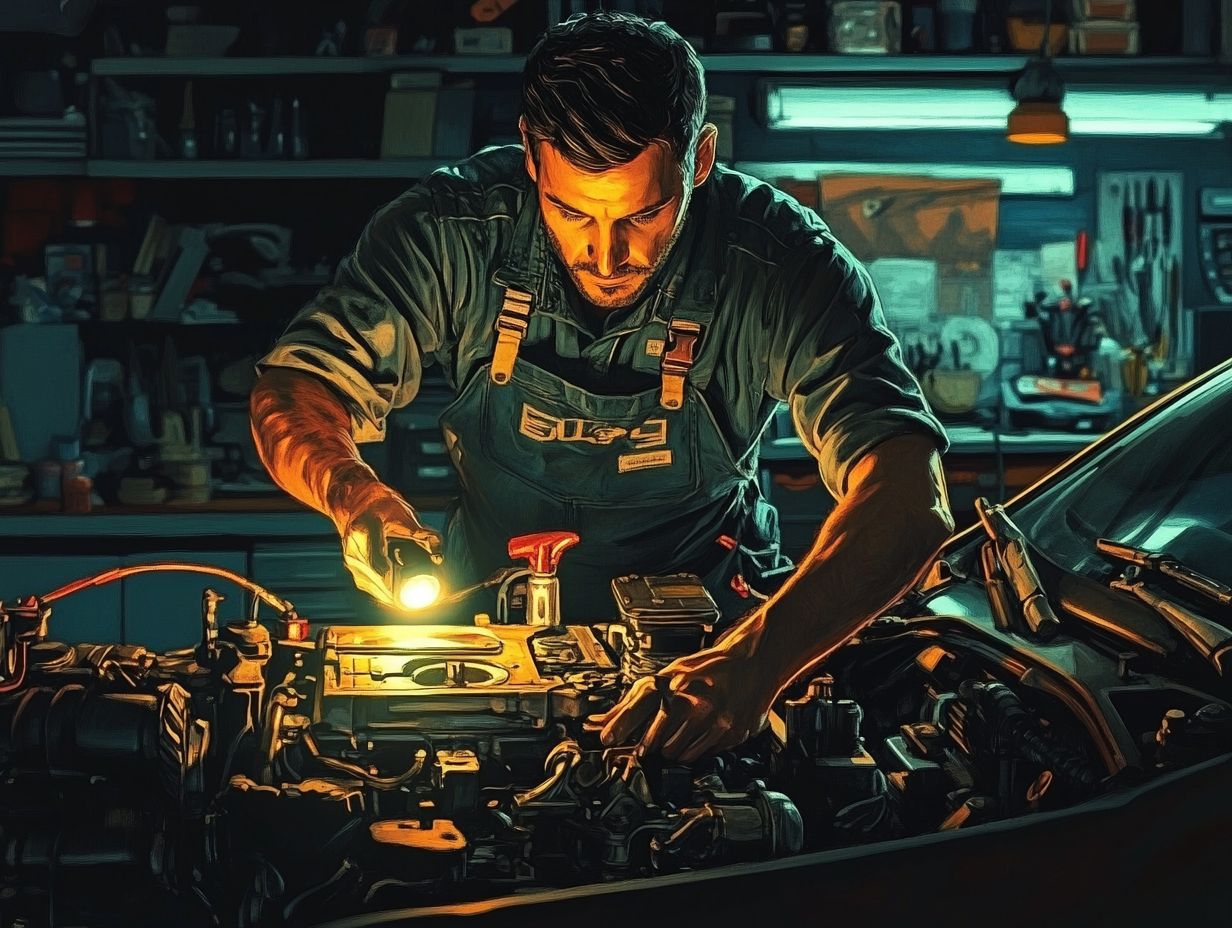
Why It’s Important to Catch Issues Early
Catching car problems early is essential for maintaining your vehicle’s performance and safety. Many issues like brake wear, fuel leaks, and electrical malfunctions can escalate into serious complications if you let them linger.
Regular vehicle maintenance extends your car’s lifespan and ensures safer driving. For example, brake system concerns might start as minor noises or a slight decrease in responsiveness. However, they can quickly escalate to complete brake failure if you ignore them.
Likewise, rust on the body or undercarriage can undermine your car s structural integrity over time. It’s crucial to regularly inspect for such issues. Then there’s coolant leakage, which can lead to engine overheating a scenario best avoided through timely evaluations.
Stick to a preventive maintenance schedule to reduce risks and avoid costly repairs in the future.
Signs of Common Car Issues
Recognizing the signs of common car issues is crucial for timely intervention and effective vehicle maintenance. Symptoms such as warning lights, fluctuations in tire pressure, and changes in engine performance can often signal deeper problems.
By understanding these signs, you enable yourself to take a proactive approach to maintenance. This ensures that minor issues don t escalate into costly repairs. Look out for key indicators like brake wear, steering wheel shaking, and unusual noises. These all demand your immediate attention to prevent further complications down the road.
Visual and Audible Cues
Visual and audible cues serve as essential signals of potential car troubles. They reveal underlying issues that could impact both engine performance and overall safety. Notice unusual sounds or vibrations? That s a clear sign your vehicle needs an inspection.
Similarly, visual signs like warning lights on the dashboard, leaks, or rust provide crucial insights into your car s health. Addressing these cues promptly can prevent minor issues from evolving into significant complications.
Take, for example, the grinding noises you might hear when applying the brakes. This could suggest worn brake pads, and ignoring it could lead to costly repairs or even accidents. Likewise, if you spot coolant leaking beneath your vehicle, it’s not just a cosmetic issue; it signals potential overheating problems that could jeopardize your engine s lifespan.
Don’t let rusty patches on metal parts ruin your ride! They can weaken your car s structural integrity, so addressing them right away is imperative.
By remaining vigilant and keeping an eye on these signs, you can ensure your vehicle operates efficiently and safely. This proactive approach not only saves you money in the long run but also enhances your car’s performance over time.
Changes in Performance
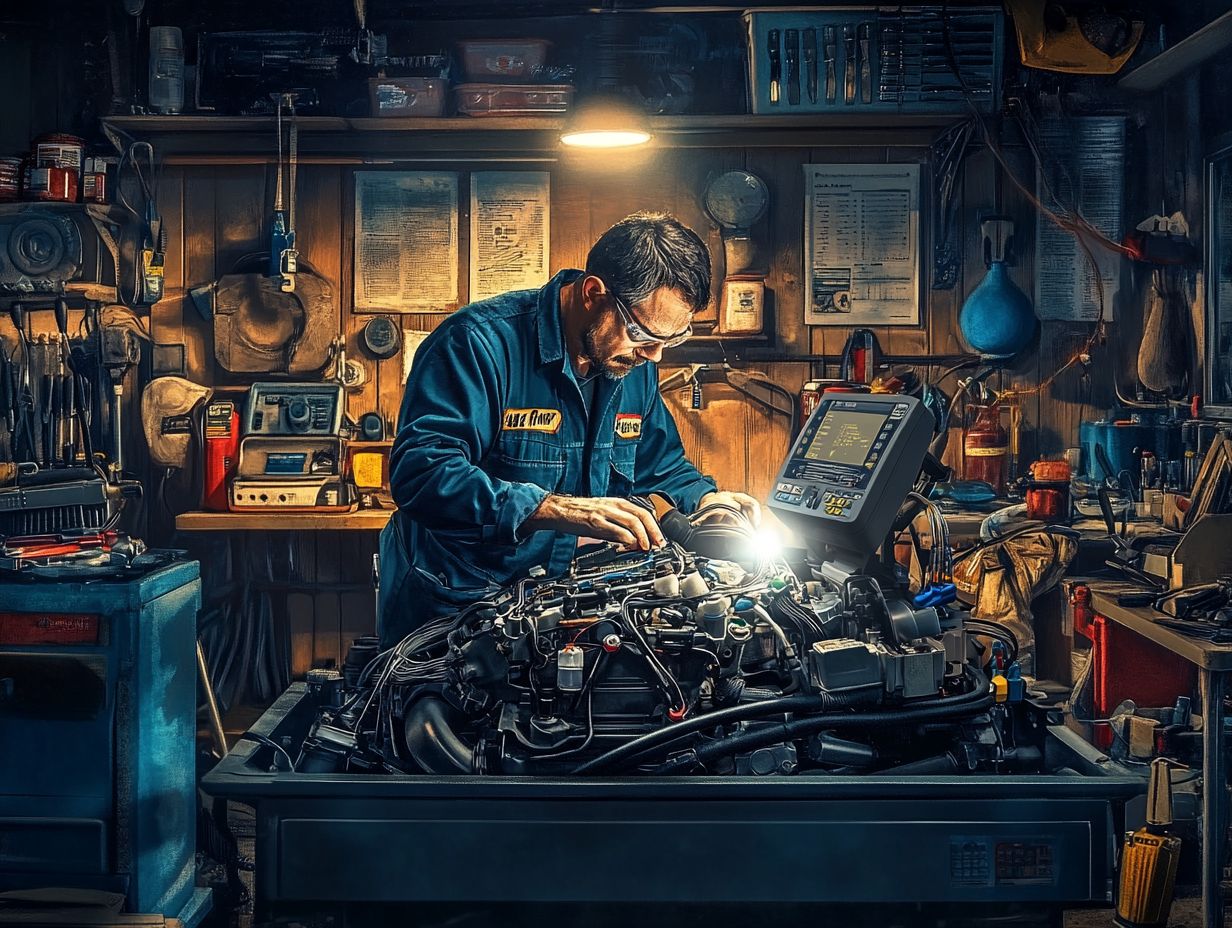
Changes in performance can signal car troubles. These may involve the engine, brakes, or tire pressure.
If you notice reduced acceleration, unusual vibrations, or trouble starting your vehicle, those could be signs of issues like a flat battery or transmission problems. Being aware of these performance changes is crucial for timely action.
For example, slow acceleration might mean problems with fuel delivery, such as a clogged filter or failing fuel pump. Irregular braking can indicate issues with brake pads, rotors, or air in the brake lines, which can compromise safety.
Fluctuating tire pressure can hurt traction and handling. This leads to uneven tire wear and reduced fuel efficiency.
Regular checks can stop minor issues from becoming major repairs. Stay vigilant about performance indicators.
How to Address Common Car Issues
Addressing common car issues means balancing DIY fixes with professional help, depending on the problem’s severity and your expertise.
Tasks like checking tire pressure or replacing wiper blades can usually be done at home. However, for more complex issues, such as engine performance or electrical problems, you should definitely call a professional mechanic.
Knowing when to do it yourself and when to seek expert help is vital for keeping your vehicle in top condition.
DIY vs Professional Help
Deciding between DIY solutions and professional assistance can greatly affect your car maintenance outcomes. Some problems are simple enough to handle; others require specialized knowledge.
Checking tire pressure or topping off oil? You can easily manage that at home. But for mechanical inspections of brake issues or serious engine troubles, it s best to bring in the experts.
Always weigh the pros and cons of each approach. For instance, a fuel leak is serious. You need a trained mechanic’s help right away to avoid safety hazards.
With rust on your car, you might do minor surface treatments yourself. Yet, deeper issues often need a professional to prevent structural damage. Electrical problems are tricky; one mistake can create more complications.
Ultimately, assess the problem’s severity to decide whether to tackle it yourself or call a professional mechanic.
Preventive Maintenance for Cars
Preventive maintenance is essential for avoiding common issues and extending your vehicle’s life. This proactive approach helps you stay ahead of potential problems affecting performance and safety.
By following recommended service intervals and scheduling regular inspections, you can catch issues like brake wear or coolant leaks early. A good maintenance schedule boosts engine performance and ensures a smoother driving experience.
Tips for Keeping Your Car in Top Shape
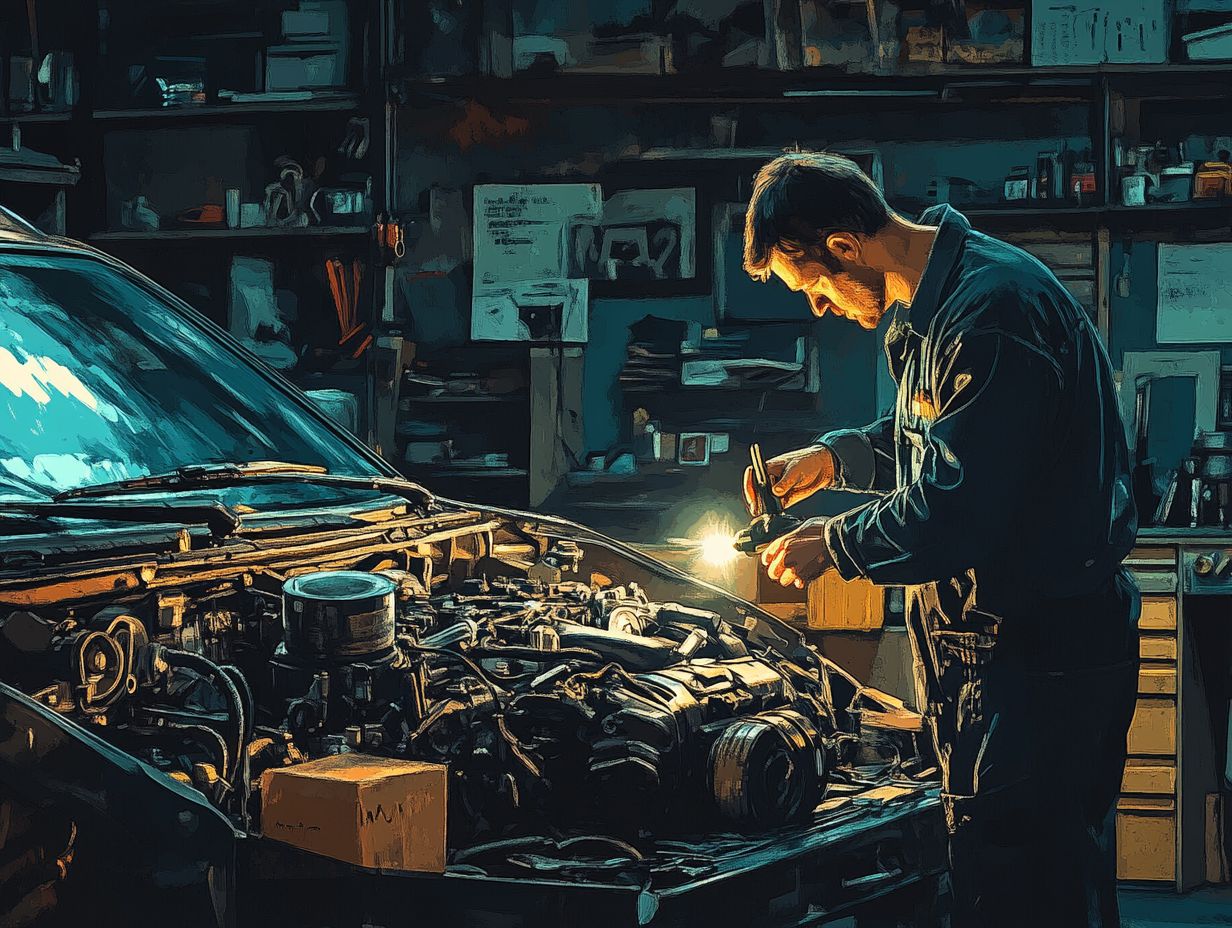
Keeping your car in top shape requires your commitment to preventive maintenance and regular checks. This ensures optimal engine performance and safety.
Stay on top of routine tire pressure checks to keep your fuel efficiency high and your grip strong! Also, stick to scheduled oil changes, as they are essential for keeping the engine lubricated and functioning smoothly.
Monitor warning lights to spot potential issues before they escalate. This effectively prevents headaches like premature brake wear, unexpected electrical failures, and that dreaded flat battery.
Each of these proactive steps contributes to a hassle-free driving experience. You’ll drive with confidence, knowing your vehicle is well cared for.
When to Seek Professional Help
Recognizing when to seek professional help for car issues is essential for your vehicle’s reliability and safety. Some problems require specialized knowledge and equipment that you, as an average driver, may not possess.
Key indicators, such as persistent engine performance issues, strange noises, or warning lights, should prompt you to consult a professional mechanic for a comprehensive car check. Ignoring these signs can lead to severe complications and significantly higher repair costs.
Red Flags to Watch Out For
Understanding the red flags can save you from costly repairs and keep your car in prime condition. Certain signs clearly indicate that your vehicle needs immediate attention. Common red flags include:
- Persistent warning lights This could mean something is wrong.
- Unusual engine performance Pay attention if your car is acting differently.
- A shaking steering wheel This may indicate tire or alignment issues.
- Visible leaks Look for any fluid pooling beneath your car.
Excessive brake wear is a serious safety concern that can diminish your vehicle’s stopping power. Fuel leaks not only pose a fire risk but can also lead to substantial engine problems if left unchecked.
Rust on your car can compromise its structural integrity. By staying vigilant about these signs and scheduling car checks whenever necessary, you can maintain your vehicle’s health and prevent minor issues from escalating into major repairs. This ultimately saves both time and money.
Frequently Asked Questions
What are common car issues that can be identified early?
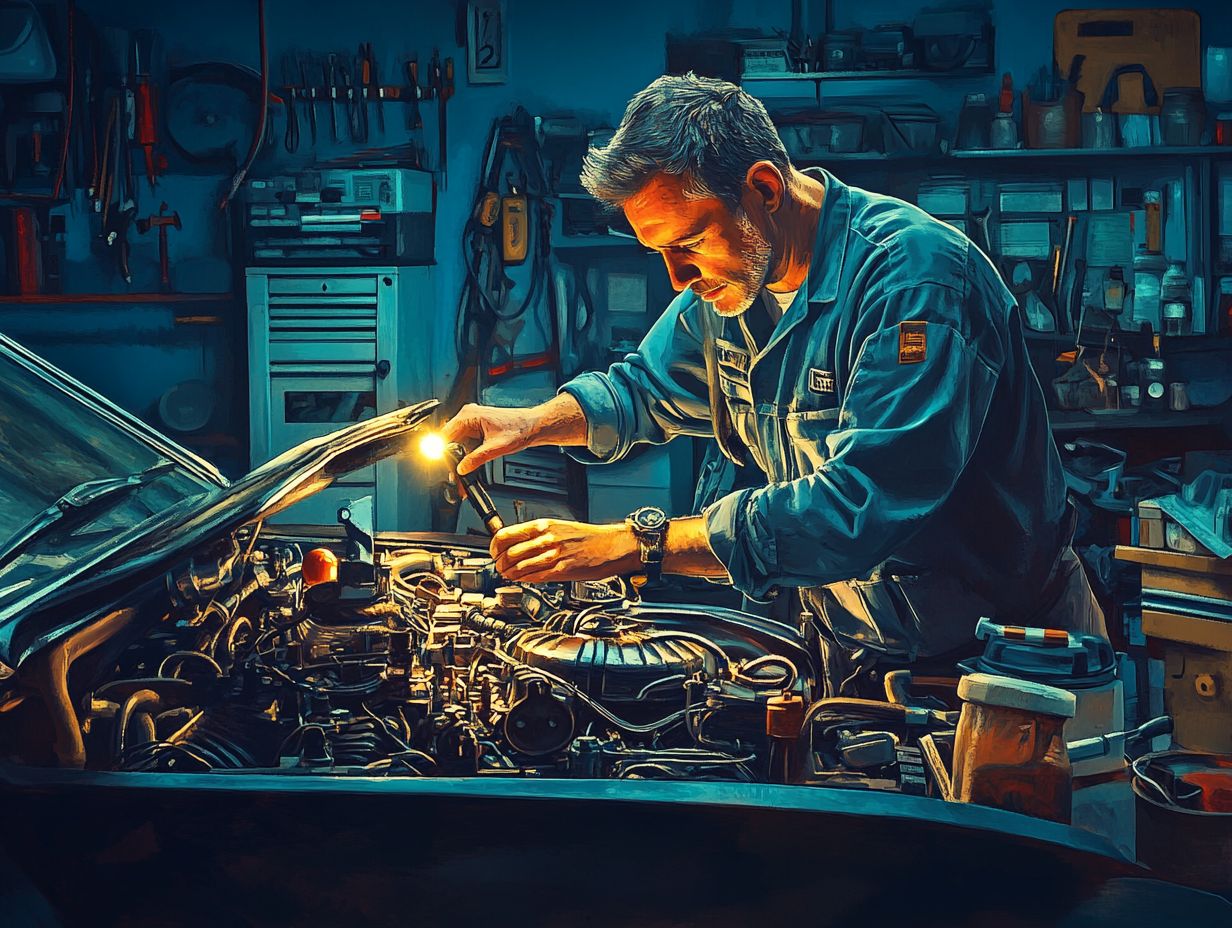
Some common car issues that can be identified early include low tire pressure, strange noises, warning lights on the dashboard, and unusual vibrations.
How can I identify low tire pressure in my car?
Low tire pressure can be identified by checking the tire pressure using a gauge or by visually inspecting the tires for signs of deflation.
What should I do if I hear strange noises coming from my car?
If you hear strange noises, take note of the type of noise and when it occurs. This information will help a mechanic identify the issue more easily.
What do warning lights on the dashboard indicate?
Warning lights can indicate a variety of issues, including low oil pressure, a malfunctioning engine, or a problem with the brakes. Address these warnings promptly to prevent further damage.
How can I tell if my car is experiencing unusual vibrations?
Unusual vibrations can be felt through the steering wheel or the floor of the car. These may indicate issues with the tires, suspension, or engine, and should be checked by a mechanic.
Why is it important to identify common car issues early?
Identifying common car issues early, such as brake problems, helps prevent serious and costly repairs in the future. For instance, recognizing common brake issues early ensures the safety and reliability of your car while on the road.



